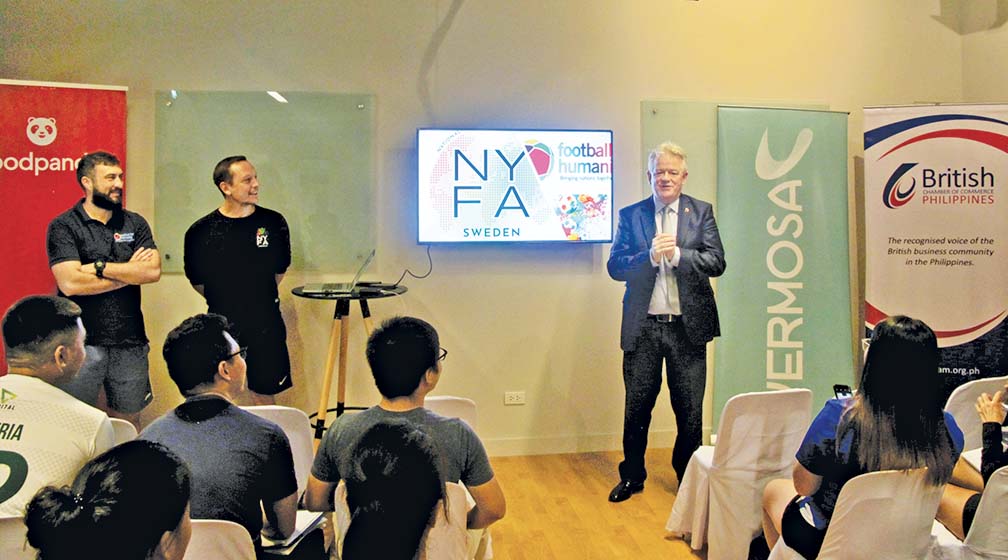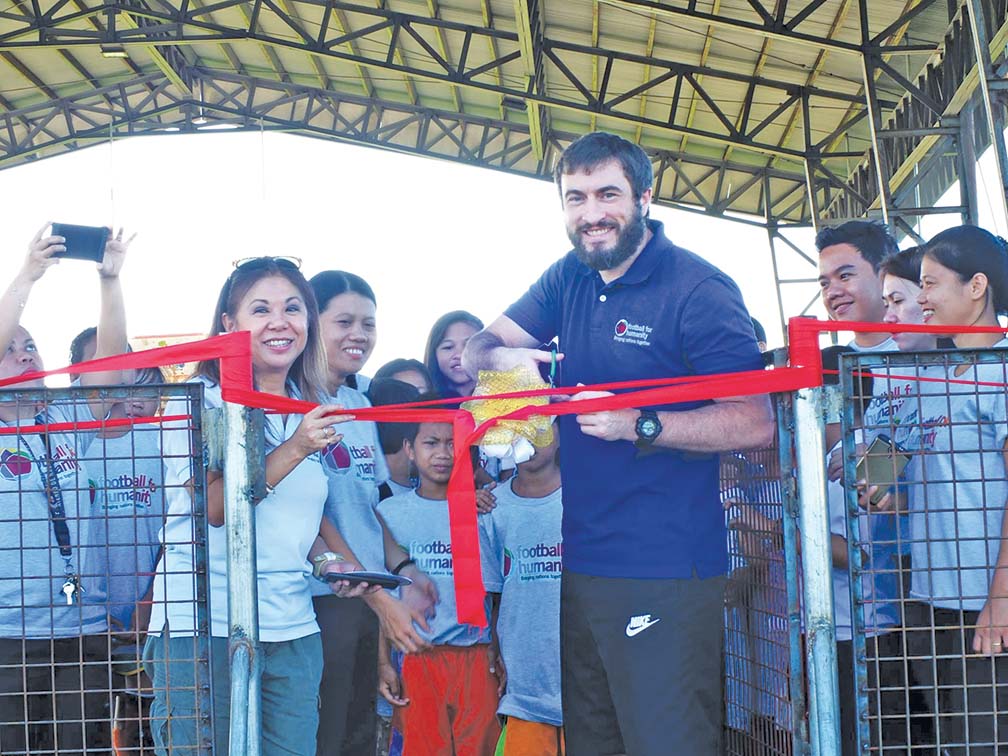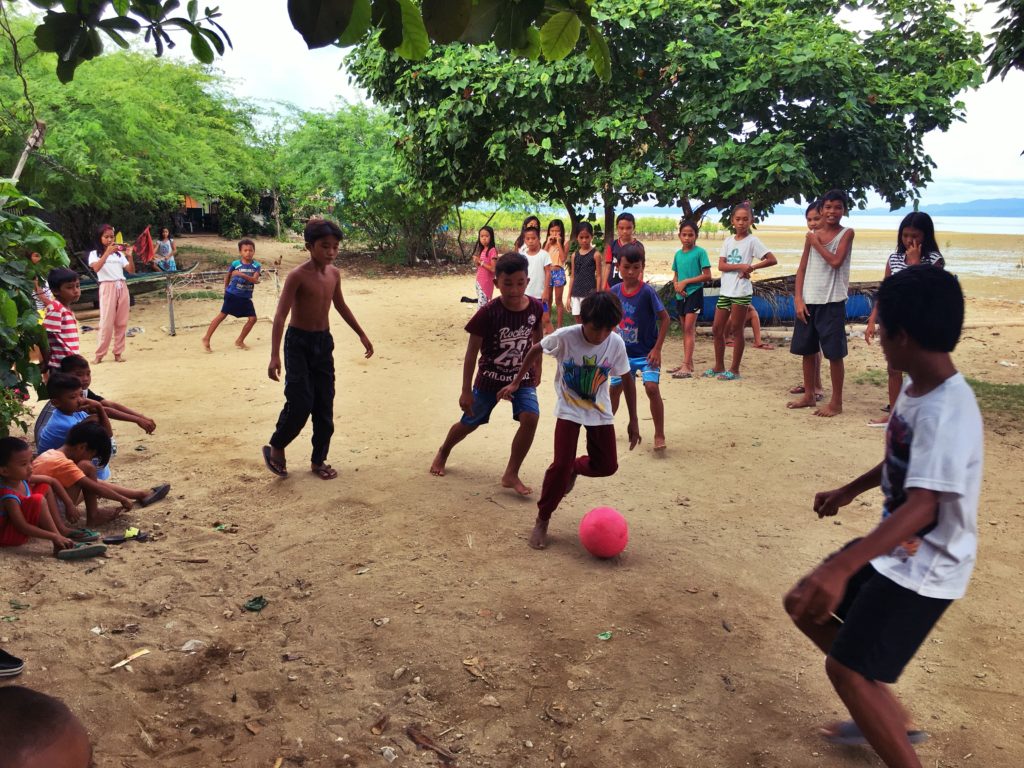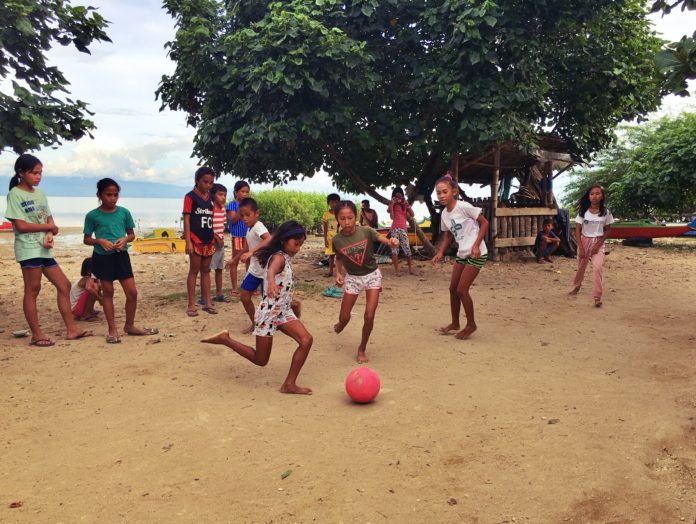The little girl went after the red ball with the ferocious energy of someone intent on scoring a goal. Lithe and agile, nine-year-old Lourdes Calago is one of 27 registered football recruits in the fishing village of Bucana, Barangay Poblacion, Guihulngan City in Negros Oriental.
It is a bright and balmy July 23, almost four months since the COVID-19 pandemic hit the Philippines in earnest.
Since May, the entire Negros Oriental province in the Central Visayas Region has been under a more relaxed Modified General Community Quarantine (MGCQ), after a hard lockdown or Enhanced Community Quarantine (ECQ) in April.
Based on the guidelines of the Inter-Agency Task Force on Emerging Infectious Diseases or IATF, “all persons shall now be allowed to go outside their residences” under MGCQ.
And while sports have likewise been allowed, this provision only covers “indoor and outdoor, non-contact sports.”
Still, this caveat on sports has not discouraged Barrio Bucana kids to go out and play football, with the blessings of their parents. With ages ranging from seven to 14, the children trained under Coach Peter Lim, a Football for Humanity (FFH) volunteer.
EMPOWERING CHILDREN
FFH is an independent charity registered in the United Kingdom and the Philippines. The foundation aims to “harness the power of football to transform the lives of children affected by armed conflict, natural disasters and extreme poverty.”
Lim joined FFH in November 2019 after attending in San Carlos City, Negros Occidental an FFH Coach and Leadership training led by English Football Association (FA) mentor and National Youth Football Association (NYFA) of Sweden founder Owen Southgate.

The coach, who had transferred to Dumaguete from his native Masbate to be with his wife and newborn baby, said the leadership training further inspired him to “gather underprivileged children and use football to empower the children and bring joy to their lives.”
“I promoted football in this place (Guihulngan), knowing that there is really no support, and they laughed at my efforts,” said Lim.
His passion for football goes as far back as 2007, when he coached kids in well-off schools like the Colegio San Agustin (CSA) Makati, Xavier School in San Juan, and Hedcen (Holistic Education and Development Center) in Taytay, Rizal.
His experience in Guihulngan taught him to improvise and adapt the teaching of football to more rustic, less privileged conditions.
“In the beginning, I started playing with children in the park, coaching two kids clad in football jerseys. Soon, they invited their friends, about seven to eight kids. There were a lot of kids from Barrio Bucana who watched and asked me if there was a fee to playing. I told them there was none,” Lim said.
He coaxed children to go into training by preparing for them, right after a game, free snacks of congee with chicken feet (pospas) and fish balls, which he called “tempura.”
“Soon, the parents saw what I was doing and brought their own kids to join,” Lim said.
GROWING A TEAM
There is no standard football field in Barrio Bucana. Lim improvised by using a small, 10 meter x 15 meter beach space facing the Tañon Gulf. The space is good for “small-sided plays” or games played with 3 vs. 3, 4 vs. 4, or 5 vs. 5 player pairings.
Basically, Lim put two goals on each end of the space and allowed the kids to play. Goals were improvised, made of scrap material from junk shops and the kids devised bamboo equipment for shooting drills.

“This kind of training encourages each player to be more alert, agile and aggressive, since the action is non-stop and very dependent on the input of each player, as against a full game that has nine or 10 players on each side,” Lim explained.
Starting with three balls and three kids, Lim saw his football team grow as the children themselves, aged eight to 14, recruited their schoolmates and friends to join.
Lim said he now has players as young as five years old. “From three kids, there are now 27 registered children and another 30 unregistered kids pending registration from the wider communities, for a total of 57 kids, and still growing.”
He added that other barangays have likewise received football training. These include: Barangay Tinayunan and Barangay McKinley, also in Guihulngan, as well as two barangays in Masbate province—Barangay Dumurog in Esperanza town and Barangay Jabuyoan in Aroroy town.
During ECQ, Lim said the kids were not allowed to go out of their homes. “All of them are poor, they are like squatters and are naturally afraid of catching COVID-19 and the possible lockdown of their barangay. Based on my experience, it was good that we gave them the balls because now playing has become their daily habit in the community.”
STRENGTHENING PARTNERSHIPS
FFH founder Chris Thomas said that due to the lockdowns, the usual activities and participation of FFH ceased, although collaboration with partners and beneficiaries continue on the ground.
“In various small communities outside Manila where the lockdown is not so severe, with the help of our partners, we have managed to get balls delivered and kids have been able to play with their new balls with extra safeguarding from community leaders and parents. It is important that at this time, whenever possible, children are still able to play and have fun, and also learn,” Thomas said.
The FFH founder managed to take a trip back to the UK and Europe to further strengthen ties with partners and potential partners so they can continue to be an active part in the mission of FFH.

“FFH wants to continue to build football pitches (football fields) in communities so that children have a safe hub where they can congregate under the observation of local authorities and leaders. We have been through challenging times behind the scenes but thank God, we have always managed to implement our plans and we can say that ours is a story of perseverance and endurance,” he added.
Between 2017 and 2019, Thomas said that the FFH has accomplished the building of six small-sided, enclosed football pitches that have “changed the way the Filipino football community viewed football training and games.”
The FFH, he added, has logged in 1,084 training hours, delivering football training and education for children, coaches, and other educators.
“We have approximately distributed 13,000 footballs for free, potentially impacting the sporting lives of 400,000 children in the Philippines. We have likewise assisted our first international football scholar Shanden Vergara in landing a football scholarship in the United States, where he is set to begin his second year as a full scholar,” Thomas said.
POVERTY, ARMED CONFLICT
For close to a decade, the province of Negros Oriental has been among the top 20 poorest provinces in the country. Poverty incidence is highest in its coastal and mountain communities, based on Philippine Statistics Authority (PSA) figures.
Commenting on the state of Negros Oriental at the 118th Philippine Independence Day celebration at Quezon Park in Dumaguete City last year, Education Secretary Leonor Briones said: “In Dumaguete, you can’t see strong indicators of poverty, but when you go to the mountains and in the coastal areas, poverty incidence is very prevalent.”
The coastal city of Guihulngan lies some 116 kilometers north of Dumaguete City, the capital of Negros Oriental.

Barrio Bucana, where Coach Peter Lim has taught children to play football, is found in Poblacion, a seaside barangay that has the highest population (22,931 persons in 2019) among Guihulngan’s 33 barangays.
“The poor people in Guihulngan has basically a hand to mouth existence. It’s rough living for most of them. Most people work on a day’s wage. If they don’t earn money on that day, they don’t eat,” said an American missionary who had lived in Guihulngan for six months.
Aside from poverty, Negros Oriental Gov. Roel Degamo has underscored Negros Oriental as being “the only province among four in Central Visayas that continues to face the problem of insurgency.”
Based on various media accounts, there have been 33 extrajudicial killings by unidentified men, usually riding in tandem in Negros Oriental.
In a Manila Times report, dated Aug. 5, it said that “the New People’s Army has taken responsibility for 11 killings while being the suspect in (at least) another three. The police killed 14 suspected members or supporters of the NPA on March 30.”
Prior to this, a July 30 Human Rights Watch report said “the island of Negros has a long history of violence stemming from festering issues of land rights, poverty, and injustice. Peasant and farmer groups have campaigned for land reform over the island’s vast sugar plantations amidst fighting between communist insurgents and government forces. Both sides have been implicated in countless human rights abuses.”
Human Rights Watch added the “attacks increased dramatically after the New People’s Army (NPA) killed four police officers on July 18 in Ayungon town. The police allege the officers had been tortured and then executed. The NPA denied this, although they confirmed killing the officers in an ambush.”
“On July 22, President Rodrigo Duterte denounced the killings and offered a reward for the capture of those responsible. Since then, there have been multiple daily killings in the province. On July 23, unidentified gunmen killed Anthony Trinidad, a human rights lawyer, in Guihulngan City. Seven people were killed in separate summary killings in different parts of the province. On July 25 alone, seven people were killed in separate summary killings in different parts of the province,” Human Rights Watch further reported.
The Human Rights Watch report said, “human rights defenders and activist groups have blamed the government for the killings.” Elected local government officials in Guihulngan claimed, however, that the NPA was responsible.
On July 23, Sunstar Bacolod reported that hundreds of Guihulnganons gathered to express their sincere commitment to end the local armed conflict in Guihulngan City by peaceful means through the “People’s Prayer Rally.”
Among those that attended the prayer rally were Guihulngan residents from 33 hinterlands and shoreline barangays, local government officials, local government agencies, volunteers from non-government organizations, different religious sectors and law enforcement agencies spearheaded by Guihulngan City Mayor Carlo Jorge Joan Reyes.
According to Sunstar Bacolod, “Around 600 peace advocates assembled and brought their placards and streamers containing messages calling for peace, denouncing the communist New People’s Army (NPA) terrorist atrocities and appealing for justice for the victims of the NPA’s human rights violations.”
FOOTBALL & TRANSFORMATION
It is against these twin fabrics of poverty and armed conflict that FFH said it has ventured into depressed provinces like Guihulngan.
“Coach Peter’s humble project is exactly what FFH stands for. Like the ‘random acts of kindness that change the world,’ these random communities where children are allowed to play and thrive— their right, according to the United Nations Convention on the Rights of the Child— are bases for transformation that can change the very society they exist in. We are happy knowing that we are protecting children from so many dangers that often dovetail poverty. FFH is inspired to continue, even during these times when all we see are dark clouds in the horizon, and we are still uncertain as to when it will clear again. In the meantime, we let the children play.,” said FFH founder Chris Thomas.

For his part, Coach Peter Lim said: “I am really optimistic and eager that someday one of the kids I teach here in Guihulngan will be a national player or a football scholar in Metro Manila. I dream that someday this place, with its killings and leftist radicals and extreme poverty can produce successful players, who will continue what I started.”—with reports from Chris Thomas, FFH Founder


